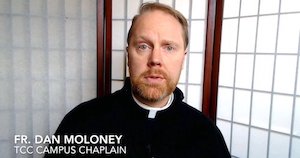Fr. Moloney’s lessons for minds that hate
- JOSEPH PEARCE
In the wake of the madness and self-righteous hysteria that has gripped the world in the wake of George Floyd’s death, Fr. Moloney’s words resound with the clarity of true prophecy.
 There was a bitter irony in the treatment of Fr. Daniel Moloney, who was forced to resign as Catholic chaplain at MIT for suggesting that we should keep our heads and not lose them in the wake of the death of George Floyd. His courage and reason cost him dearly as those who are animated by emotion, not reason, demanded the priest's head on a platter. Responding to the demands of those who hate with abject and craven cowardice, the archdiocese delivered the priest over to the mob.The irony is that Fr. Moloney is the author of a recently published book, Mercy: What Every Catholic Should Know (Augustine Institute/Ignatius Press), which shows that the only way of achieving justice is through a correct understanding of mercy. "If both justice and mercy are virtues," Fr. Moloney writes, "they cannot be contrary to each other."
There was a bitter irony in the treatment of Fr. Daniel Moloney, who was forced to resign as Catholic chaplain at MIT for suggesting that we should keep our heads and not lose them in the wake of the death of George Floyd. His courage and reason cost him dearly as those who are animated by emotion, not reason, demanded the priest's head on a platter. Responding to the demands of those who hate with abject and craven cowardice, the archdiocese delivered the priest over to the mob.The irony is that Fr. Moloney is the author of a recently published book, Mercy: What Every Catholic Should Know (Augustine Institute/Ignatius Press), which shows that the only way of achieving justice is through a correct understanding of mercy. "If both justice and mercy are virtues," Fr. Moloney writes, "they cannot be contrary to each other."
In a chapter entitled "Justice-Only Politics", Fr. Moloney warns that a situation of "pervasive injustice" leads to the "danger of scapegoating". It is ironic indeed that Fr. Moloney should himself have become a scapegoat in these times of pervasive injustice. There is also a section of his book which takes its title from a verse in the New Testament, "The Wrath of Man Does Not Accomplish the Righteousness of God", in which Fr. Moloney speaks of the dangers inherent in righteous anger. Injustice is so pervasive, he tells us, that if we allowed ourselves to be angry about every injustice we learn about, we would be angry all the time:
We would be angry at racism and sexism, at religious discrimination and wasteful government spending, at conspicuous consumption on the personal level and at exploitation of the worker, at environmental degradation and cruelty to animals, at the plight of refugees, and at domestic violence and sex trafficking and child abuse and on and on. If we were to live this way, we would be so angry at so many things that there would hardly be a difference between our supposedly virtuous selves and a raving lunatic. We would become bitter. Therefore, it seems unlikely that anger, even righteous anger, is actually a good thing.
In the midst of the madness and self-righteous hysteria that has gripped the world in the wake of George Floyd's death, Fr. Moloney's words resound with the clarity of true prophecy. He then quotes from Scripture to illustrate the dangers of righteous anger. Apart from the passage from the Epistle of St. James, quoted already, Fr. Moloney offers the wisdom of the Book of Psalms: "Refrain from anger; abandon wrath; do not be provoked; it brings only harm." He then reminds us of the words of St. Paul that we must put away "anger, fury, malice, slander, and obscene language". And then, as a final coup de grâce, he offers the commanding authority of Christ Himself in the words of the Sermon on the Mount: "I say to you, whoever is angry with his brother will be liable to judgment."
And here's what Fr. Moloney says about the angry intolerance of those who preach liberal "tolerance":
Injustice is so pervasive, he tells us, that if we allowed ourselves to be angry about every injustice we learn about, we would be angry all the time:
The irony here is that in the name of preventing one set of social conflicts, tolerant liberalism threatens to provoke another. Tolerance is not mercy, but rather is a part of liberal conceptions of justice. Which means that, perhaps surprisingly, today's tolerant liberalism is another form of what we have called justice-only politics. And like all justice-only politics, it can be inhumane toward those who oppose it, and it can lead to conflict and social instability over time.
Again, it is deeply ironic that Fr. Moloney, a prophet of the merciless inhumanity of justice-only politics, should become a victim of that very same inhumane intolerance of dissent. And the irony becomes even more palpable in Fr. Moloney's warning about the dangers of justice-only politics leading to the sacrifice of scapegoats:
The practice of scapegoating, even when done in the name of "justice," tends to lead to division in society, as we "throw people under the bus" and "kick them to the curb," anathematizing them … and so in their merciless scrutiny the watchdogs of "justice" threaten everybody. Justice-only politics aspires to totalitarian tyranny.
How ironic that the author of these words of merciful wisdom should himself become a scapegoat who would be "thrown under the bus" and "kicked to the curb" by his own archdiocese.
The overarching lesson that Fr. Moloney teaches in Mercy: What Every Catholic Should Know is the flawed nature of the mob's threatening demand that "no justice" means "no peace". This is true but it misses the point that if there's no mercy there can be no justice. If those rampaging through the streets could read this good priest's good words, they might come to their senses instead of showing no mercy to those whom they have turned into scapegoats.
But the mob is not going to read Fr. Moloney's words and will not, therefore, heed the wisdom that he speaks, preferring instead to stone the prophet rather than listen to him. As for the rest of us, especially those of us who are in danger of becoming as angry as the mob which has angered us, we could do far worse than to sit down and read this important book.
 This is Meaghen Gonzalez, Editor of CERC. I hope you appreciated this piece. We curate these articles especially for believers like you.
This is Meaghen Gonzalez, Editor of CERC. I hope you appreciated this piece. We curate these articles especially for believers like you.
Please show your appreciation by making a $3 donation. CERC is entirely reader supported.

Acknowledgement
 Joseph Pearce. "Fr. Moloney’s lessons for minds that hate." Catholic World Report (June 24, 2020).
Joseph Pearce. "Fr. Moloney’s lessons for minds that hate." Catholic World Report (June 24, 2020).
Reprinted with permission from Catholic World Report.
The Author
 Joseph Pearce is Director of Book Publishing at the Augustine Institute, editor of the St. Austin Review and series editor of the Ignatius Critical Editions. Among the books he has authored are: Benedict XVI: Defender of the Faith, Literature: What every Catholic should know, Tolkien: Man and Myth, C. S. Lewis and the Catholic Church, Literary Catholics, Race With the Devil: My Journey from Racial Hatred to Rational Love, Beauteous Truth: Faith, Reason, Literature and Culture, Through Shakespeare's Eye, J.R.R. Tolkien's Sanctifying Myth: Understanding Middle-Earth, Unafraid of Virginia Woolf, Solzhenitsyn, and Old Thunder: A Life of Hilaire Belloc.
Joseph Pearce is Director of Book Publishing at the Augustine Institute, editor of the St. Austin Review and series editor of the Ignatius Critical Editions. Among the books he has authored are: Benedict XVI: Defender of the Faith, Literature: What every Catholic should know, Tolkien: Man and Myth, C. S. Lewis and the Catholic Church, Literary Catholics, Race With the Devil: My Journey from Racial Hatred to Rational Love, Beauteous Truth: Faith, Reason, Literature and Culture, Through Shakespeare's Eye, J.R.R. Tolkien's Sanctifying Myth: Understanding Middle-Earth, Unafraid of Virginia Woolf, Solzhenitsyn, and Old Thunder: A Life of Hilaire Belloc.


